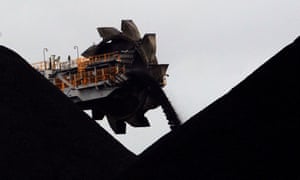
The Queensland government has struck a royalties agreement with miner Adani, which would allow it to defer payments due at the Carmichael coalmine – a move conservationists have slammed a “disgrace”.
Negotiations for the deal have been fraught and taken several years. The deal, announced by the state treasurer, was signed this week just days before the government is due to enter caretaker mode ahead of the state election.
State treasurer Cameron Dick told reporters in Mackay on Thursday that the deal would mean Adani will ultimately pay interest on any deferred payments, and that it had been agreed under the provisions of a royalties framework set in May 2017.
The policy was widely considered to have been developed specifically for Adani – it allowed the Queensland government to offer the miner a royalty deferment, while at the same time maintaining a long-term promise not to provide any taxpayer funding.
One of the terms of the government’s framework requires any project granted a deferral to offer some security for payment. Guardian Australia understands this has been the significant stumbling block during the process – Adani’s main Australian asset, the Abbot Point coal terminal, is heavily leveraged and facing difficulties refinancing its $1.5bn debts.
Adani ran a bruising anti-Labor campaign prior to the federal election, and afterwards the Palaszczuk government fast-tracked approvals processes, including the royalties deal, that had otherwise stalled.
It is understood Labor wanted the matter settled, and was concerned that Adani might seek to make the royalties agreement an election issue in working class and coalmining areas.
He said the deal had been signed earlier this week.
“That’s absolutely locked in now. [The] terms are consistent with the RRDF.
“I can assure you that Adani will pay every dollar in royalties they have to pay to the taxpayers of Queensland with interest.”
When asked why the process took so long, Dick said: “We wanted to work through the details, that is why we have spent time doing that.”
“We’ll continue to roll out resource and royalties agreements with mining companies as our mining industry and our resources industry continues to grow, delivering a dividend right back to Queensland.”
Environmental groups and analysts have long challenged the notion that a royalties deferral does not amount to taxpayer assistance for Adani. The agreement will allow the miner to increase its cash flow during the early years of the project, in turn allowing it to more quickly repay the upfront costs of construction.
Such a deal is particularly beneficial for Adani, given the company’s inability to obtain finance for the project, and its decision in late 2018 to self-fund a slimmed-down version.
The Australian Conservation Foundation said the deal was “a disgrace”.
“Why is the government handing out freebies to a billionaire coal baron?” ACF campaigner Christian Slattery said.
“Australia’s big four banks and dozens of other financiers around the world have distanced themselves from Adani, yet the Queensland government has rolled out the red carpet for a mine that will soon become a stranded asset.
“Astonishingly, the public is still in the dark about the details of this deal, which has been stitched up behind closed doors.
“The government should immediately disclose the terms of this deal. Queenslanders have a right to know how much revenue and risk has been sacrificed at the altar of Adani’s destructive coal mine.”’
“We’re in the middle of a historic recession and Queensland Labor are giving a multinational coal corporation a tax break with a royalties holiday,” Berkman said.
“First they freeze royalties, then they cut workers wages and now they’re doing deals with Adani.
“We don’t need more coal mines, we need investment in manufacturing, public housing and publicly-owned renewable energy.”
Adani has approvals to build a 60m tonne-a-year mine, which would create annual emissions of 79m tonnes a year from burning coal. The company plans to only build a smaller mine – initially producing about 10m tonnes – before expanding.


